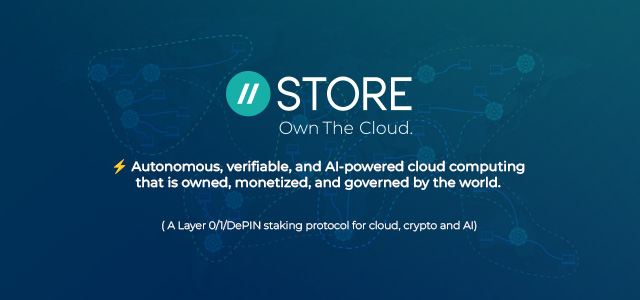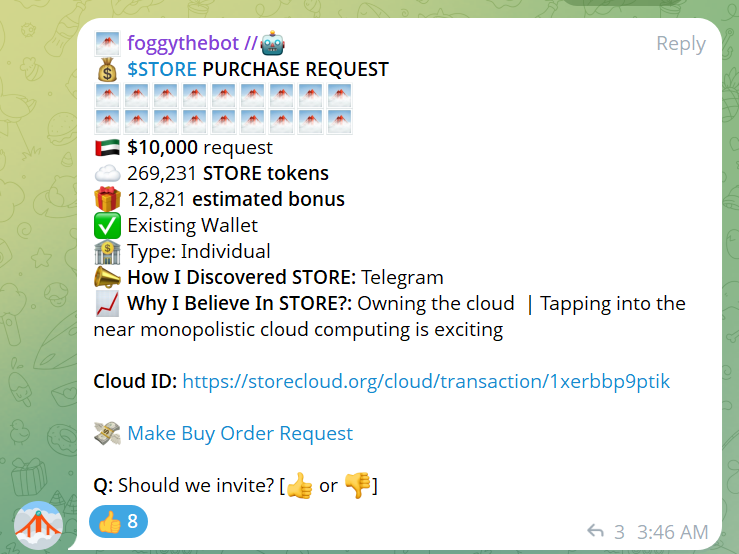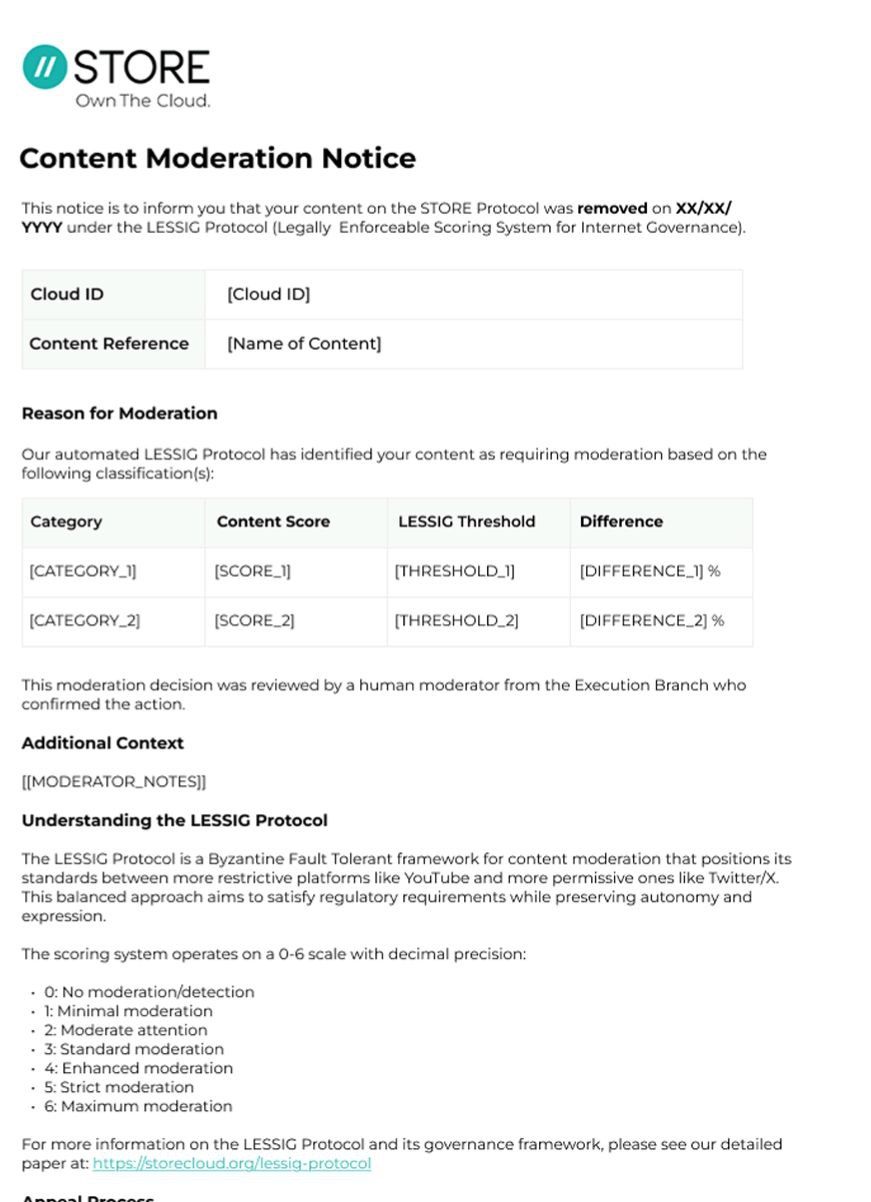Subscribe to receive STORE research, news, and updates
About $STORE
User-owned computing and democratically governed AI. Own The Cloud.
STORE Community Update - July, August & September 2025
STORE Protocol's Q3 2025 update: STORE Pay launch, permanent AI storage, Swiss regulatory progress, and BFT Democracy breakthroughs for Q4 launch.

Greetings, STORE community! It's been a few months since our last monthly update, as we published our comprehensive State of STORE report in mid-August. This update primarily focuses on the significant progress our team achieved throughout September, while highlighting key breakthroughs from July and August that set the foundation for our current momentum.
We understand the urgency around Q4 launch timing, and your concerns about market conditions and revenue generation are valid—timing matters for adoption and liquidity. The reality is we need both capitalization and time to complete our remaining backlog. We have approximately $472,841 remaining to reach our Marcus Aurelius Milestone before securing a lead investor. This milestone is critical because it positions us to write larger checks to establish operations in Switzerland while completing the technical infrastructure required to launch an autonomous economy that operates as a tax-paying protocol entity within the country.
The precision this demands is exactly what we're achieving. Post-Aurelius, we'll unlock institutional funding opportunities and shift from global fundraising to recruiting a lead investor who can support us through Switzerland establishment and beyond for the next decade. Once STORE Pay is complete and we're through Aurelius, we'll have a compelling technical offering for any institutional financier.
Engineering
September delivered transformative breakthroughs across our entire technical infrastructure, with multiple critical systems reaching production deployment and positioning us for Switzerland launch. Our engineering achievements this quarter represent years of foundational work crystallizing into launch-ready systems.
STORE Pay represents our most significant achievement this period. We've completed the integration of payments directly into the protocol layer, a monumental upgrade over our previous email-based approach. The system handles all forms of payment, cryptocurrencies, credit/debit cards, wire transfers, and stablecoins, while supporting every economy on STORE and eventually the selling of cloudspace computing resources. The system routes our entire economy moving forward and meets Switzerland's regulatory requirements for automated economic operations. The finishing touches are now in place after extensive work to understand how to fully build and connect it with our compliance and accounting requirements simultaneously. We've introduced a COSTS sub-protocol that allows all fees associated with payments—including permanent storage and card processor fees—to be deducted from economic transactions, positioning us firmly in the business of selling cloudspace as a different form of decentralized computing than traditional layer one blockchain computers. With success, this service becomes part of the developer tools that STORE Cloud sells to developers, enabling them to accept currencies with accounting and automation just like us.

STORE Send has shipped its first production version and represents critical infrastructure for automated token distribution. This service streamlines crypto payments to verified users through seamless integration with our KYC processes, governance, and blockchain infrastructure. The system automatically triggers secure token distributions when users are CLEAR, while providing manual distribution capabilities for administrative campaigns. This eliminates the operational overhead of processing thousands of individual transactions while ensuring compliance through built-in audit trails, approval workflows, and real-time monitoring. Once completed, with all payment channels flowing correctly into the proper accounts, this infrastructure positions us to scale token-based incentive programs efficiently while maintaining security and regulatory compliance as we grow our user base. Our aim is for STORE Registration and token release to be powered by CLEAR, giving us the confidence to pursue our autonomous computing experiment where the protocol's balance sheet accepts tokens from developers building on STORE infrastructure in exchange for computing resource payments.
STORE AI achieved a monumental leap in July with successful fusion into permanent storage, positioning us to become the world's first democratically governed permanent AI. With permanent storage of AI endpoints in place, combined with comprehensive changelog tracking for all changes to AI weights and rules through transparent democratic processes, we've established the technical foundation for Protocol AI. This represents what we believe is a new class of AI capable of underpinning protocols and large language models with advanced economic, governance, security, and coordination intelligence. The system now powers dynamic governance reporting rather than static reporting, with 30-40 additional Intelligence Endpoints integrated once our BFT Democracy technical paper is finalized.
TREASURIES continues advancing behind the scenes with significant reconciliation and balancing work completed for our token budgets for STORE Switzerland. We're several steps closer to releasing full sales history on the protocol, and we shipped the go-forth version of TREASURIES landing page internally in July. The integration with STORE Identity remains enterprise-grade, with production-ready tooling helping users track deposit value, transaction histories, and automate withdrawals.
The STORE Monetary System has broken through into its next evolutionary layer. We've completed R&D on all flows and funds, positioning us to move into API development of this foundational project we've been working on since the beginning. We're building a test network for this monetary system inside our secure wallet environments. This API-driven approach unlocks modularity for the STORE Economy and CLEAR.. Once completed, our API-driven architecture enables the STORE Economy to be connected into our wallet environments in real-time with dynamism and self-governance, unlocking the protocol's ability to launch its own token economy inside Switzerland. Now that we've streamlined CLEAR by upgrading STORE Pay, we're applying these learnings and efficiencies to our other core launch economies. Once we're through a full build of CLEAR as a meta protocol within STORE, we'll mint these sub-economies on top of a fully built-out CLEAR, then finish digitizing the STORE Economy down into the AI and resource level before finalizing STORE Registration.
CLEAR has undergone substantial evolution throughout this period, transitioning from email-based operations to fully integrated payment infrastructure. To fortify CLEAR, we separated our transactional email domain (storecloud.org) from our forthcoming opt-in email broadcast and communications network, conservatively building email reputation for this new domain. We've experienced important learning lessons about properly separating services even when they share component parts—critical knowledge for scaling the STORE economy and adding new economies while keeping existing ones stable. The system is now 100% powered by STORE AI moving forward, with stable email communication rails in place.
Beyond core infrastructure, several forward-looking research initiatives are advancing. We've made progress on STORE Drip, our incentivized airdrop process that treats the work needed to qualify as productive rather than viewing airdrops as non-productive token economy use. We're piloting automated on-chain payment recognition with zero manual verification required, which if successful will be integrated into CLEAR. We've also introduced BOOST, our autonomous computing framework where the protocol exchanges computing resources to developers in exchange for up to 20% of their native currency's emissions—think AWS meets Y Combinator. This enshrines sound money into the app and AI layer at STORE while giving the STORE Association a rules-based economy to safely manage liquidity and infrastructure capitalization. We expect to launch an early registration portal for developers in the coming weeks. Finally, in July we shipped a glimpse of STORE Robotics, a major use case for Physical AI that will evolve post-launch to become what we believe will be the world's first verifiable and democratically governed cloud infrastructure for robotics applications—imagine autonomous drones and robot fleets operating with complete transparency and human control, coordinating with their own token economies while autonomously paying for computing and blockchain infrastructure.
Operations
Our operational focus this quarter centered on regulatory readiness, economic infrastructure automation, and next-phase capitalization preparation. These interdisciplinary efforts represent the critical foundation required to launch the protocol in Switzerland with a tax and regulatory compliant framework that's nearly 100% automated.
Switzerland Economic Integration advanced significantly throughout this period. In July, we began the work to integrate CLEAR into the STORE Association's accounting, bookkeeping, and tax compliance systems in real-time, bringing CLEAR, Transactions, and Finance into the same project—work we've been building toward for multiple years. August and September proved to be critical R&D months on this front, with this integration work required for Switzerland operations. In mid-August, we began to transition administration of payment confirmation from the Execution Branch (STORE Research) to the Treasury Branch. The first formal act was OTC operations, where our Treasury Branch leads our trading of BTC/ETH into fiat for operating expenses. Next will be the accounting and finance layers, fully positioning the STORE Economy to run through the Swiss Association.
The State of STORE publication was successfully released in mid-August, providing our community with comprehensive insights into our journey, technical achievements, and the path forward. The technical requirements were completed in early August following final legal review and confirmation that CLEAR is operational for token sales while being architecturally separated from other future economies. This separation of services—even when they share component parts—proved critical for scaling the STORE economy and represents important learning for our requirement to add new economies while keeping existing economies stable.

Organizational Expansion Planning is underway as we prepare to grow our research and engineering organization following successful capitalization over the next three months. This expansion will enable us to support the launch of the existing protocol while beginning to expand and upgrade into On-Demand Verifiable Cloud Computing with autonomous computing support. Everything we build starts with us—we're the first customer of our own tools and protocol. Once we've stabilized our side of the technology equation, we can build the developer platform for the rest of the world to build on as well. The protocol is live today, and each evolution brings us closer to expanding so developers and users can build on it.

Governance
September marked critical progress in our governance infrastructure and constitutional framework, with substantial advancements in the mathematical and technical foundations required for Byzantine Fault Tolerant Democracy in Switzerland.
BFT Democracy Technical Specification achieved major breakthroughs throughout this period. In July, we developed the first mathematically rigorous framework for decentralized governance of AI systems—constitutional mathematics that make tyranny impossible rather than just difficult. Our HAT (Human Authentication Threshold) Protocol uses Hamilton's constitutional mathematics (the same 1/3 power limit that's governed America for 237 years) to create automatic consensus scaling from 67% to 75% as AI approaches superintelligence. Unlike traditional governance tokens that can be captured through wealth concentration, constitutional mathematics create hard mathematical bounds where no single entity can control more than 33% influence, making rug pulls and governance capture mathematically impossible. STORE AI is the first AI to adopt this framework, and we'll instrument other AI and infrastructure to help them move into democratic AI governance.
MIQ Consensus Protocol development has made strong progress throughout September. We've established the mathematical foundation to build consensus protocols inside computing systems and AI where no single party controls the trust—requiring ≥67% agreement instead. This consensus infrastructure launches from Switzerland as the underlying protocol enabling BFT Democracy with trust minimization rather than central authority requirements. We continue working on the establishment of STORE Protocol's constitutional framework with MIQ as the foundation.
MME Regulatory Engagement progressed through iterative research deliveries following the State of STORE release in August. We shifted our R&D efforts from outbound communication back into internal research, focusing on finalizing the technical specification for BFT Democracy. Our research package was delivered to MME for regulatory and strategic review in mid-August, with weekly stand-up calls scheduled to maximize our speed into Switzerland. Our expectation is weekly research iteration to move quickly through any outstanding items requiring solutions. We also continue working to resolve the outstanding MiCA issue. Once we have approval from MME with sufficient treasury resources, we can begin forming the legal entity in Switzerland, securing directors and officers insurance, and initiating the process for Judicial Branch elections. The founding three Stewards will give us a human-controlled +2/3 supermajority democracy, which we expect to grow to five founding Stewards once the protocol launches with stability. From here, this group will lead the protocol into adding an additional layer of checks and balances with staked Governors.
LESSIG Protocol completed its first full draft IEEE technical paper in August, advancing our automated content moderation framework essential for satisfying Swiss/EU/MiCA requirements while maintaining operational integrity through Byzantine Fault Tolerant Democracy.

Wrap-up
As we move into Q4, every engineering breakthrough, operational milestone, and governance advancement positions STORE to deliver user-owned computing, transparent governance, and economic participation for our global community. The intensity of our work reflects the magnitude of what we're building together—the foundational infrastructure for user-owned computing, transparent governance, and autonomous economic participation. We remain laser-focused on crossing the finish line into Switzerland and delivering the protocol that will enable a new era of decentralized, democratically governed infrastructure for humanity's computational future.
Learn More About STORE
Explore STORE's innovative cloudspace architecture and vision for user-owned cloud computing:
Highlighted Materials
-STORE Cloud Series Seed Investment Memo: http://storecloud.org/seriesseedmemo
-STORE Cloud Super Summary: http://storecloud.org/summary
-STORE Technical Demo (video): https://youtu.be/IBB2O_ktMOQ
-STORE Quick Deck: http://storecloud.org/deck
-State of STORE Annual Report: https://storecloud.org/state-of-store-summer-2025
Other Materials
-STORE Long Deck: http://storecloud.org/longdeck
-STORE Comparison (L1, DePIN, and Public Clouds: http://storecloud.org/compare
-STORE Launch Plan and Roadmap: http://storecloud.org/launch
Latest Public Research
-Read our IEEE Paper "Enabling Autonomous Computing Through Decentralized Cloud ID Generation"
How To Help Us Grow
-Join as a long-term token partner (invite-only): http://storecloud.org/buyorder
-Join as a long-term equity + token warrant partner (invite-only): http://storecloud.org/equity
-Follow us on LinkedIn and Twitter/X
-Share STORE Cloud with your network
For questions, contact team@storecloud.org



